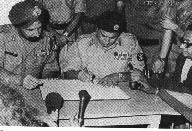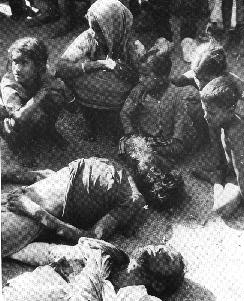Chapter 4: Obsolete Resolutions
The UN Commission
resolutions have become obsolete. This view was expressed by the UN Commission
itself as far back as 1949, and has been reiterated by Dr. Jarring and
Dr. Graham, both UN representatives. Passage of time, change of circumstances,
and Pakistan's repeated and continuing violations, have ruled out all possibility
of implementing them.
Pakistan tried to impose a military solution by
launching a war against India in 1965. The pattern was familiar. Massive
infiltration was followed by invasion of Indian territory on September
1, 1965.

Pakistani POWs of the 1965 conflict.
A cease-fire came about after a 22-day war with
India in possession of large tracts of Pakistan's territory. An agreement
was signed at Tashkent between India and Pakistan on January 10,1966 with
both countries agreeing to withdraw to the international border and the
cease-fire line in Jammu and Kashmir.
Pakistan imposed yet another war in 1971 invading
India on December 3. It again failed in its objective despite millions
of East Pakistanis being brutally exterminated by the Pakistan Army. East
Pakistan became an independent country. As many as 93,000 Pakistani soldiers
surrendered to the Indian Army and after 16 days of war, the Indian Army
was once again in possession of Pakistani territory in the Western Sector.
After the war, bilateral talks were held in June/July 1972. Under the terms
of this Agreement, the two countries undertook to resolve all differences
bilaterally. Pakistan, through its commitment in the Agreement agreed to
shift once for all the Kashmir question from the UN to the bilateral plane.
For meaningful dialogue Pakistan was expected
to create the right climate. Instead, after a few years Pakistan began
its familiar game again by supporting terrorism in Punjab and Kashmir.
This, to say the least, was in utter disregard of the Shimla Accord, apart
from being unfriendly and provocative in the extreme.

Gen. A. A. Niazi of Pakistan surrenders to
Gen. J. S. Aurora of India,
after the liberation of Bangladesh.
SELF-DETERMINATION
The other favorite argument put forward by Pakistan
is of self-determination It has tried to elicit world support on the plea
that the people of Jammu and Kashmir have been denied the right of self-determination.
India fully subscribes to the principle of self-determination.
It can be operative only when one is dealing with a nation as a whole,
and the context in which it can be applicable is the context of conquest
or of foreign domination or of colonial exploitation. It could lead to
dangerous consequences if the expression were extended to apply to an integral
part of any country or sections of its population or to enable such integrated
part or sections of the population to secede. The principle of self-determination
cannot and must not be applied to bring about the fragmentation of a country
or its people.

Massacre in East Pakistan.
History tells us that the United States fought
a bloody civil war to prevent the whole of the South of the Union from
seceding and constituting itself into an independent country. A large majority
of the people of that part of the United States were opposed to Abraham
Lincoln and his policies and they wanted the freedom to refuse to emancipate
the slaves, and yet the United States government, very rightly and properly,
refused to break up the country by permitting a part of it to secede.
REACTIONARY THESIS
Pakistan's thesis is a reactionary and obscurantist
one. The thesis of self- determination which Pakistan advocates, has been
used in the recent past by colonialists and neo-colonialists for the disruption
of newly emergent states. Pakistan would have the hands of the clock set
backwards and would go back to the days when countries permitted only one
religion and persecuted those who followed another faith.
India has already exercised the right of self-determination
through a Constituent Assembly of elected representatives, in which the
people of Jammu and Kashmir participated. The Indian people gave to themselves
a Constitution which has been in force for over four decades. Under the
constitution, ten general elections based on universal adult suffrage have
been held.
In order to draw up a Constitution for internal
administration of the State, within the larger framework of the Constitution
of India, the people of Jammu and Kashmir elected representatives on the
basis of universal franchise thus giving a practical demonstration of the
exercise of their right of self-determination.
The stateÕs Constituent Assembly drew up
a democratic constitution under which the people of the state enjoy political
freedom and civil liberties. General elections in the state have been held
under the supervision of the Election Commission of India except in the
last few years when, because of continued terrorist activities, the State
Assembly has had to be suspended.
One cannot resist the temptation of asking Pakistan
a few pertinent questions. Did Pakistan permit the people of Princely States
in Pakistan to exercise the right of self-determination after the ruler
acceded to Pakistan? As was disclosed in the West Pakistan High Court a
few years ago, the accession of Bahawalpur had been forced on the ruler
of the State. The Khan of Kalat revolted against accession and was arrested
and detained in 1958. In neither case was the principle of self-determination
applied. When Pakistan purchased, mark the word "purchased", the territory
of Gwadur from the Sultan of Muscat, what happened to Pakistan's solicitous
regard for the people's right to self- determination? No opportunity was
given to the people of Gwadur to say whether in the second half of the
twentieth century they wished to be bought like chattel.
Pakistan's harping on self-determination today,
against the principles of the UN Charter on self-determination which are
meant to apply to colonial territories and not to integral parts of countries,
is only a cover for territorial ambitions.
As far as the UN resolutions on Kashmir were concerned,
two UN mediators had warned that they were getting obsolete. The report
by the president of the Security Council, Gunnar Jarring, warned: "The
implementation of international agreements of an ad hoc character which
has not been achieved fairly speedily, may become progressively more difficult
because the situation with which they were to cope has indeed to change."
That was said on April 29,1957.
The very last report by a UN mediator was that
of Dr. Frank Graham's dated 28 March, 1958. It referred to a major clause
regarding mutual troops withdrawal and said that "the execution of the
provisions of the resolution of 1948 might create more serious difficulties
than were foreseen at the time the parties agreed to that. Whether the
UN representative would be able to reconstitute the status quo which had
obtained 10 years ago, would seem to he doubtful." Thirty-six years have
elapsed since.
It also needs to be recalled why Pakistan insists
on a solution as per the nearly half-century old UN resolutions and why
it is untenable. Pakistan did at no time observe the resolutions, either
in spirit or letter. It has its own interpretation of the UN resolutions
to offer, even when the self-same resolutions give a lie to the Pakistani
view. Take Pakistan-occupied Kashmir for instance. If there has to be a
plebiscite it will he confined only to the Indian parts of Jammu and Kashmir.
Not the Pakistan-occupied territories. And there again the only choice
the Kashmiris have is to choose between Pakistan and India.
And yet as late as January 29, 1994, the Jammu
and Kashmir Liberation Front (JKLF) leader, Amanullah Khan, speaking in
Muzaffarabad, tartly reminded Pakistan Prime Minister Benazir Bhutto that
Pakistan's persistent rejection of the third option of independence for
Kashmir is "tantamount to denying the very right of self-determination"
Pakistan has been harping about a right which, he asserted, cannot be "limited,
conditioned or circumscribed". But Pakistan's espousal of the right to
self-determination has always been self-servingly conditional and circumscribed.
Apart from other provisions, one has only to read
para 6 of the Plebiscite Resolution to realize that it is incapable of
enforcement. The para provides for the return of State citizens who left
it on account of the disturbances of 1947.
The resolution of August 13, 1948, provided that
"pending a final solution, the territory evacuated by Pakistani troops
will be administered by the local authorities under the surveillance of
the Commission". Pakistan has planted a "State" there in breach of this
provision. We shall talk about it in the next chapter.
| 
















No one has commented yet. Be the first!